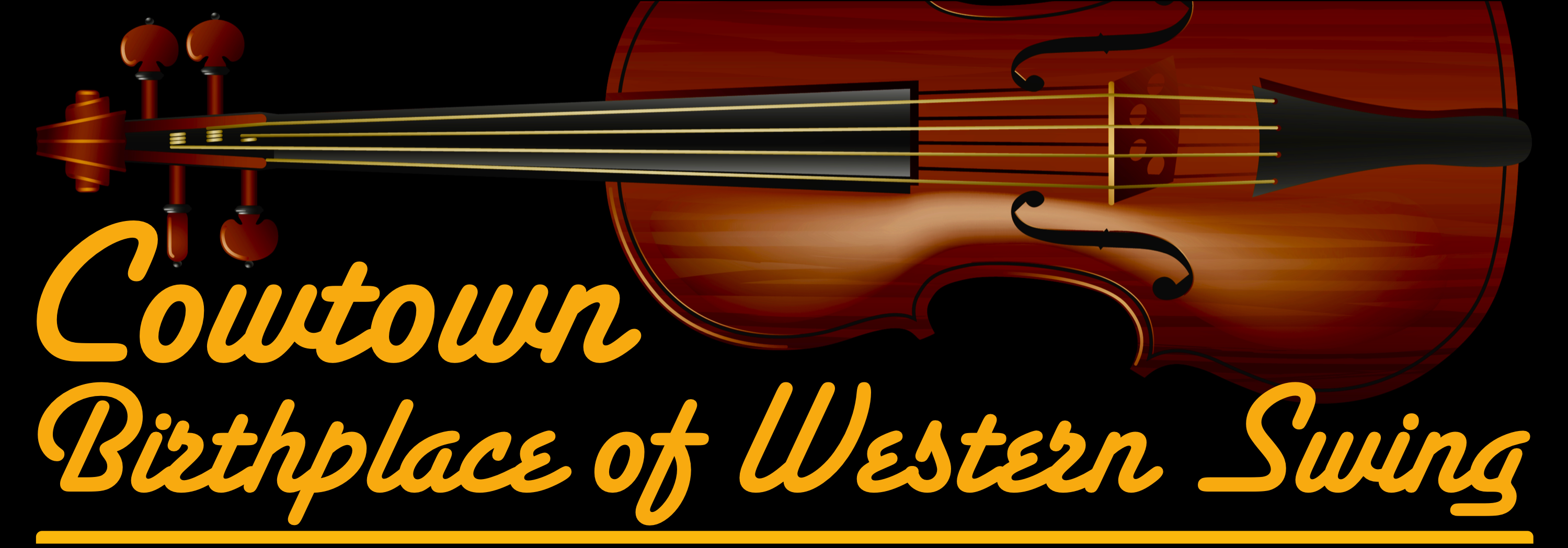Smokey Montgomery
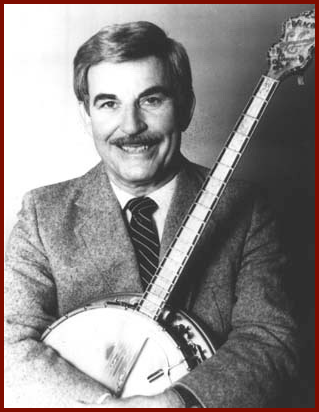 Marvin "Junior" "Smokey"
Montgomery (1913-2001), banjo player, was born Marvin Dooley Wetter on March 17, 1913, in Rinard, Iowa. Marvin was the eldest of two
brothers born to Charles Henry and Mabel Wetter. He started singing in church at the age of six. When he was ten he learned to play
chords on a banjo ukulele by accompanying his mother as she played the piano. He soon began to play a real banjo that his mother had
bought for his younger brother.
Marvin "Junior" "Smokey"
Montgomery (1913-2001), banjo player, was born Marvin Dooley Wetter on March 17, 1913, in Rinard, Iowa. Marvin was the eldest of two
brothers born to Charles Henry and Mabel Wetter. He started singing in church at the age of six. When he was ten he learned to play
chords on a banjo ukulele by accompanying his mother as she played the piano. He soon began to play a real banjo that his mother had
bought for his younger brother.
His parents were divorced when he was thirteen, and to help make ends meet Marvin and his mother maintained a band that played at dances until he graduated from high school. Marvin went to Iowa State at Ames, studied industrial arts, and, with a cousin who also played banjo, made meal money by touring around southern Iowa playing for tips. In 1933 a traveling tent show from Texas came to Ames and held an amateur contest. Marvin entered but placed second to a little girl of five or six who won with a tap dance. The manager of the show, J. Doug Morgan, was impressed with Marvin's playing, however, and invited him to join the show two weeks later. Marvin packed his belongings and banjo when school let out, and his grandfather drove him to Grinell, Iowa, to join the show. As the tent show toured through Illinois and Iowa that summer, Marvin was asked to pick a stage name, since the name Wetter did not look good on a marquee. He liked Robert Montgomery, a popular movie actor, so he became Marvin Montgomery. The show traveled through Missouri that fall, to Texas that winter, back up to Iowa and Illinois the following summer, and in the fall of 1934 returned to Texas, where the performers took a break in Victoria for Christmas vacation. Montgomery, homesick for Iowa, bought a train ticket with the money he was able to save on the tour, and traveled until his money ran out in Dallas.
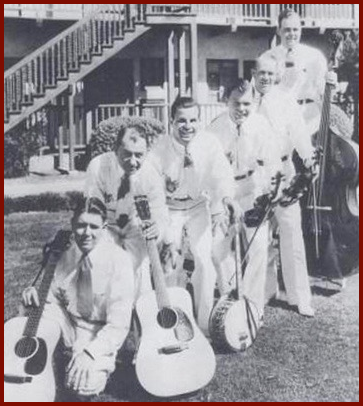 He arrived in Big D early in the morning and walked to the Adolphus Hotel, where he knew Blackie Simmons and the Blue Jackets
had an early-morning radio show on KRLD, which broadcast from the hotel. Montgomery auditioned for Simmons, who put him on the show
that same morning. Simmons offered him a job playing at a party for the manager of KRLD that night. The party turned out to be a
stag party, and after it was over, Marvin was no longer homesick for Iowa. At the party another player from a band called the Texas
Wanderers, who had a radio show on WFAA, offered him a job. Montgomery played banjo for the Wanderers until he joined the Light Crust
Doughboys as "Junior" Montgomery in October 1935.
He arrived in Big D early in the morning and walked to the Adolphus Hotel, where he knew Blackie Simmons and the Blue Jackets
had an early-morning radio show on KRLD, which broadcast from the hotel. Montgomery auditioned for Simmons, who put him on the show
that same morning. Simmons offered him a job playing at a party for the manager of KRLD that night. The party turned out to be a
stag party, and after it was over, Marvin was no longer homesick for Iowa. At the party another player from a band called the Texas
Wanderers, who had a radio show on WFAA, offered him a job. Montgomery played banjo for the Wanderers until he joined the Light Crust
Doughboys as "Junior" Montgomery in October 1935.
The extremely popular Doughboys had a radio show on WBAP and the Texas Quality Network. In 1936 they made two movies with Gene Autry, Oh Susannah and The Big Show, in which Montgomery played, rode a horse, and sang. In 1937 Marvin married his first wife, Kathleen. The Doughboys went off the air in 1942 as America fought World War II. Montgomery spent the war in Fort Worth, where he put his industrial arts skills to use manufacturing six-inch shells for the United States Navy. In 1945 the Doughboys' radio show resumed, and the group began performing on WBAP-TV in 1948 as the Flying X Ranchboys. They were the first band to appear on television in Texas.
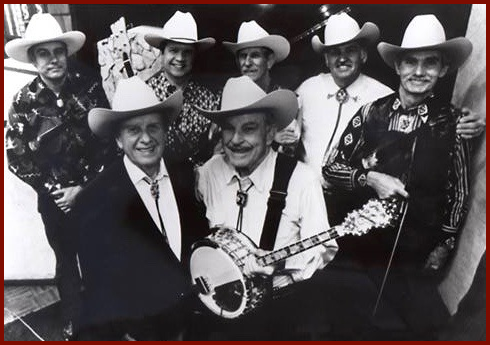 Marvin played so fast that his hand was blurred by the early television cameras, and the Doughboys changed his nickname from
"Junior" to "Smokey" because his hand looked like smoke on the TV screen. The Light Crust Doughboys' radio broadcasts became more
sporadic and eventually ceased as television grew in popularity in the 1950s, but Montgomery and the Doughboys continued playing
at county fairs and other live events, as they did into the twenty-first century. Montgomery became the de facto leader of the
Doughboys in the late 1940s. By the early 1950s to 1962 he was also the musical director of the Big D Jamboree, a weekly radio
show syndicated nationally from Dallas that featured well-known and rising stars in country music. Montgomery and the Doughboys,
the house band for these shows, performed under the name Country Gentlemen. Under the same name they backed Elvis Presley on one
of his early tours.
Marvin played so fast that his hand was blurred by the early television cameras, and the Doughboys changed his nickname from
"Junior" to "Smokey" because his hand looked like smoke on the TV screen. The Light Crust Doughboys' radio broadcasts became more
sporadic and eventually ceased as television grew in popularity in the 1950s, but Montgomery and the Doughboys continued playing
at county fairs and other live events, as they did into the twenty-first century. Montgomery became the de facto leader of the
Doughboys in the late 1940s. By the early 1950s to 1962 he was also the musical director of the Big D Jamboree, a weekly radio
show syndicated nationally from Dallas that featured well-known and rising stars in country music. Montgomery and the Doughboys,
the house band for these shows, performed under the name Country Gentlemen. Under the same name they backed Elvis Presley on one
of his early tours.
As folk music became popular in the 1960s, Montgomery helped form a Dallas group called the Levee Banjo Band, which later became known as the Levee Singers. The group performed across the country, played shows in Las Vegas, and appeared on many popular television shows. With fellow Levee Singer Ed Bernet, Montgomery built the famed Sumet-Bernet Studios in Dallas in 1962 and began a successful career producing pop music. In 1962 he produced and played piano on Bruce Channel's hit "Hey! Baby," which earned a gold record. Later that year he also produced and played guitar and vibes on "Hey Paula" by Paul and Paula (Ray Hildebrand and Jill Jackson),the Number 2 record in 1963, which also earned a gold record. Montgomery remained prominent in the Dallas-Fort Worth music and studio scene for many years after that and was part of Bob Wills's last recording session for the album For The Last Time - Bob Wills & his Texas Playboys, organized by Tommy Allsup and Merle Haggard in late 1973.
In the 1980s Montgomery formed a Dixieland group, Smokey and the Bearkats, which performed variously as a trio, a quartet, and quintet. They performed at many jazz festivals. Smokey was chosen to be the banjo player with the All World All Star Band in 1985. In 1989 he formed the Dallas Banjo Band, a thirty-plus-piece group that achieved renown by playing such works as Beethoven's Fifth Symphony. Throughout this period Smokey was still active with the Light Crust Doughboys. In April 1989 he was inducted into the Texas Western Swing Hall of Fame for introducing the Dixieland banjo to western swing in 1935. In October 1989 he was inducted into the Western Swing Society Hall of Fame in Sacramento, California, along with Gene Autry. The Western Swing Halls of Fame in Seattle and Nashville inducted him in 1991.
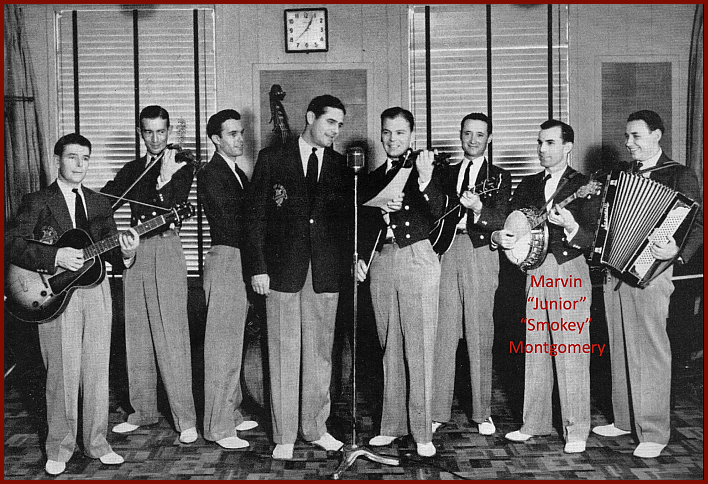 In the 1990s the Doughboys shifted
their music towards gospel and released four Grammy-nominated albums late in the decade.
Montgomery's first wife, Kathleen, died in 1992, after fifty-five years of marriage. With his second wife, Barbara, Montgomery and
Art Greenhaw of the Doughboys wrote the music and lyrics for a program called God Bless Amarillo (and All the Cowboys, Too), which
was performed by the Doughboys and the Lone Star Ballet in Amarillo in 1998. The Doughboys also released the songs on a CD. In 1998
Montgomery was made the first member of the National Four-String Banjo Hall of Fame in Guthrie, Oklahoma, and the Jazz Banjo Festival
held there placed him in its Ring of Honor. In 2000 the Light Crust Doughboys and the Lone Star Ballet performed another program
called Gospel, Strauss and Patsy Cline, for which Montgomery had written the arrangements.
In the 1990s the Doughboys shifted
their music towards gospel and released four Grammy-nominated albums late in the decade.
Montgomery's first wife, Kathleen, died in 1992, after fifty-five years of marriage. With his second wife, Barbara, Montgomery and
Art Greenhaw of the Doughboys wrote the music and lyrics for a program called God Bless Amarillo (and All the Cowboys, Too), which
was performed by the Doughboys and the Lone Star Ballet in Amarillo in 1998. The Doughboys also released the songs on a CD. In 1998
Montgomery was made the first member of the National Four-String Banjo Hall of Fame in Guthrie, Oklahoma, and the Jazz Banjo Festival
held there placed him in its Ring of Honor. In 2000 the Light Crust Doughboys and the Lone Star Ballet performed another program
called Gospel, Strauss and Patsy Cline, for which Montgomery had written the arrangements.
Though he still played every night and day, Montgomery had struggled with leukemia for some time. He died on June 6, 2001, less than a month after his last performance with the Light Crust Doughboys. His funeral service was held at the Hall of State on the State Fair of Texas grounds in Dallas. He was inducted, as a member of the Light Crust Doughboys, into the Rockabilly Hall of Fame in 2000 and the Texas Radio Hall of Fame in 2006.
